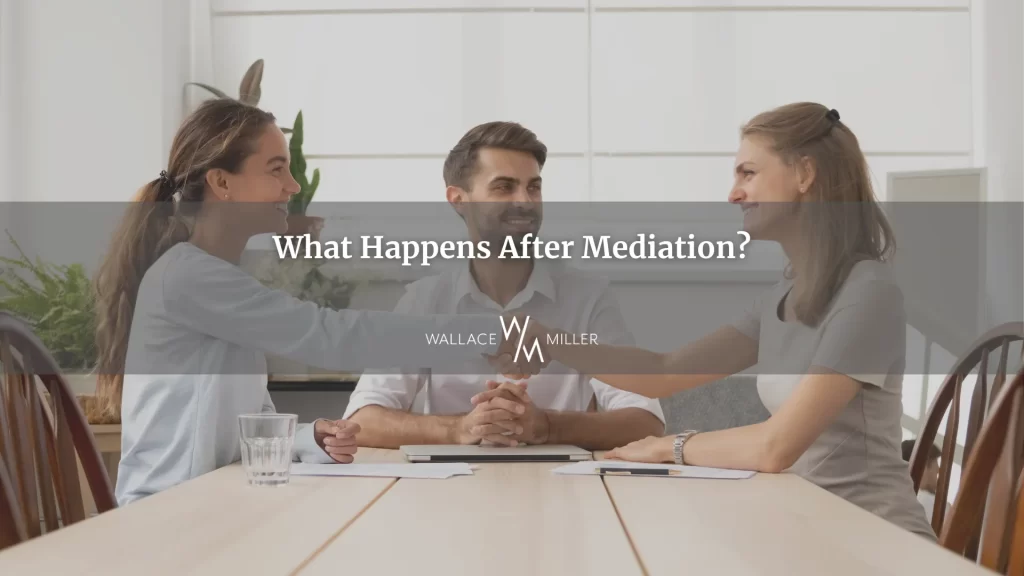Posted on Saturday, January 20th, 2024 at 9:00 am

The Illinois State Bar Association (ISBA) lists mediation as a valid Alternative Dispute Resolution (ADR) option. If you’re involved in a Chicago personal injury case, mediation is an option to consider when negotiations stall. What happens after mediation? That depends on the outcome of the mediation session.
Whatever the outcome, your experience throughout the mediation process can benefit from the experience of a Chicago personal injury lawyer. Get in touch with our legal team at Wallace Miller by contacting us online or calling (312) 261-6193.
Understanding the Mediation Process in Chicago Personal Injury Cases
The insurance company may not immediately offer a fair settlement when you file a personal injury claim. This is common. Personal injury cases often involve settlement negotiations.
Unfortunately, sometimes those negotiations can come to a standstill. You could file a lawsuit to seek damages in court when this happens, but doing so naturally involves some risk. There’s no guarantee you’ll win at trial. If a judge or jury doesn’t award damages, you’ll receive no compensation. Going to court can also be both time-consuming and costly.
How Does Mediation Work?
Mediation lets you attempt to resolve your case out of court. It involves a neutral third party helping you and the insurance company or the liable party’s representatives discuss potential settlement terms more productively.
Personal injury mediation in Illinois usually involves:
- All parties agreeing to a mediator and meeting at an agreed-upon location for a mediation session
- The mediator introducing themselves and explaining the mediation process
- Both sides summarizing their arguments in opening statements
- The mediator meeting with each party to essentially serve as a go-between
The role of the mediator isn’t to force an outcome. In addition, a mediator can’t propose settlement terms, although they can make suggestions to help the parties reach an agreement. Their function is to listen to both sides’ arguments and present them in a setting that promotes civil discussion.
What Happens After Mediation in Chicago Personal Injury Cases?
What happens after mediation varies depending on whether a mediation session was successful. The following general overview covers potential outcomes:
When Mediation Is Almost Successful
It’s entirely possible that you were prepared for mediation and the session was going well, and the parties felt that they were nearing an agreement but then ran out of time. It’s possible to schedule a second mediation session to conclude negotiations if the parties agree that another session would be beneficial.
When Mediation Is Successful
 Successful mediation results in all parties agreeing to settlement terms. However, a mere verbal agreement doesn’t make mediation legally binding.
Successful mediation results in all parties agreeing to settlement terms. However, a mere verbal agreement doesn’t make mediation legally binding.
Once the parties have reached an informal verbal agreement, they must sign a document outlining the settlement terms. Signing an official contract makes the terms of a mediation session legally enforceable.
Once the insurance company receives the signed contract, they will cut a check for the total amount of the settlement. This check will be sent to your attorney. Your attorney will pay any outstanding liens against your settlement, such as liens from healthcare providers who agreed not to pester you to pay them until your case was settled. After that, they will take money from your settlement for the expenses of your case that they paid on your behalf, such as filing fees, document reproduction fees, expert witness fees, deposition costs, etc.
Next, your attorney will take their agreed-upon percentage of your settlement for their fee. After that, they’ll send you the rest of the settlement money, and your case is over.
Ideally, all parties involved will sign the contract and abide by its terms. That said, sometimes parties sign mediation agreements only to violate them later. The wronged party who signed the agreement can take legal action if this happens.
When Mediation Isn’t Successful
You are under no obligation to sign a mediation agreement. If the other party still refuses to make a fair offer, you have other options.
Arbitration is one such option. According to the ISBA, arbitration is another form of ADR in which an arbitrator or arbitration panel reviews the facts of a case and issues a decision. Arbitration is sometimes a more efficient and affordable alternative to going to trial. According to the State of Illinois Circuit Court of Cook County, arbitration may also be mandatory in some circumstances.
You may also resume negotiations with the insurance company if mediation is unsuccessful. However, you likely opted for mediation because negotiations were going nowhere. Thus, you may decide to file a lawsuit and go to trial if you suspect negotiating a fair settlement will prove impossible.
Contact a Chicago Personal Injury Attorney
Navigating mediation (and all other aspects of your case) is much easier with proper legal representation. A Chicago personal injury lawyer from Wallace Miller can offer such assistance before, during, and after mediation. Peruse our past cases won and settlement outcomes for an idea of our expertise. Learn more about what we can do for you by contacting us online or calling us today at (312) 261-6193 for a free case review.
Related Reading:
